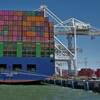Prices for Eurobonds from many commodity-exporting emerging markets have fallen sharply this week on fears that the latest metals price reversal will hit the ability to repay debt, especially in some African countries.
A major casualty of the metals price plunge is Glencore , whose bonds and shares have tanked to a record low. Almost a third of the mining and trading firm's value was wiped out on Monday alone.
The moves underscore the challenges faced by economies and companies exposed to the sector and to China's slowdown.
Fears of job cuts by Glencore and other mining firms are weighing on the assets of producing nations, especially Zambia whose kwacha currency plunged 17 percent on Monday to record lows. Glencore has mooted slashing 3,800 jobs in Zambia, where it is the second biggest employer.
Prices for Zambian sovereign dollar bonds have also hit their lowest ever levels.
The weakness has fed through the African Eurobond market, sending Gabon's 2024 dollar-denominated bond to a record low and Ghana's 2023 issue to its weakest in 10 months. Angola's 2019 and Nigeria's 2021 Eurobonds are meanwhile changing hands at their cheapest price for a month, according to Tradeweb data.
Prices have fallen between 10 and 20 cents so far this year.
"(The selloff) is connected to the general fears for the global economy and the latest data print of China shows that fears of a sharp slowdown are becoming more material," said Michael Ganske, head of emerging debt at Rogge Global Partners.
He was referring to Chinese data that showed a 9 percent slump in the profits of industrial companies last month.
The numbers drove copper and aluminium prices to one-month lows while zinc and platinum tumbled to five- and 6-1/2-year lows respectively.
Oil prices remain under $50 a barrel.
"The Glencore story is ... not supportive at a time like this when investors don't know what is the right strategy. When newsflow is negative at the margin, the reaction is to mark down bonds," Ganske said.
Africa at Sharp End
Bonds of other, bigger commodity exporters were not spared, with Kazakh paper also hitting one-month lows. Kazakhstan is a major exporter of copper, zinc and oil. Fellow ex-Soviet energy exporter Azerbaijan saw the price of its 2024 dated Eurobond tumble to 10-month lows.
Rating agency Standard & Poor's has named South Africa, Chile, and Peru as most vulnerable to a Chinese import slowdown, followed by Malaysia and Colombia.
Broadly, investors are now demanding a 475 basis-point premium to U.S. Treasuries to hold emerging sovereign dollar debt, according to the EMBI Global index, the highest in 6-1/2 years. Colombian and Chilean spreads are the highest since 2009.
Brazil has taken the biggest hit amid a deepening currency and political crisis, with its yield premium to Treasuries at an 11-year high of 532 bps, having doubled from end-2014 levels.
But Damien Buchet, CIO for Total Return Strategies at Finisterre Capital said that while Latin America would suffer, economies were far more diversified than in sub-Saharan Africa.
Even in relatively developed South Africa, commodities comprise 57 percent of exports -- across Africa, manufactured goods accounted for just $58 billion in 2011, compared with total exports of $458 billion.
"Latin America ... may hit investors' pockets more as people are more heavily invested in Brazil or Colombia than in Ghana but the pace of deterioration is slower," Buchet said, noting there was also greater trust in policymaking.
"If you look at Colombia, they are commodity dependent but they have a lot of policy credibility," he added.
Africa Reversal
For seven years, bonds from sub-Saharan Africa enjoyed a warm welcome from yield-hunting investors. But clouds started to gather this summer, when Zambia had to fork out a hefty 9.375 percent interest rate on a $1.25 billion Eurobond.
In contrast, Zambia's debut Eurobond in 2012 received a rapturous welcome, paying 5.625 percent on a $750 million issue that was 15 times subscribed.
"Everyone is looking over their shoulder right now, saying 'ok, let's do some extra work and decide whether or not we want to hold some of these credits'," said Kevin Daly at Aberdeen Asset Management.
Zambia shows it will be both costlier and harder for countries to refinance maturing debt.
"There is a growing realisation that there has been some fundamental weakness, and then there is worry about the whole China link, so add it all up and you get softer prices and slack demand for a lot of those names," Daly added.
The picture now is of slower growth, budget deficits and fears that countries could slide back into the debt trap, a decade after sweeping debt forgiveness deals.
Reassurance provided by low debt-to-GDP ratios is also eroding as sharp currency depreciation raises repayment costs as well as debt ratios in local terms.
More defaults are likely across emerging markets, Charles Robertson, head of research at Renaissance Capital warned, adding: "The rally in the dollar and low commodity prices may well continue for many more years than markets currently assume."
(By Sujata Rao and Karin Strohecker; Editing by Catherine Evans)













